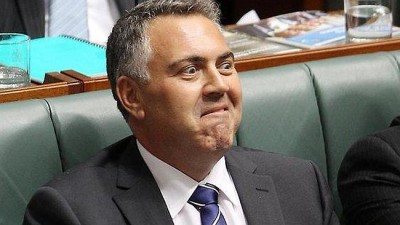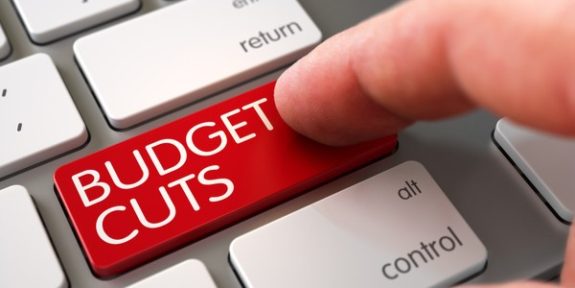We have a budget problem.
It’s not a budget emergency. Everyone agrees about that… at least, everyone who understands about national finance and economics, which is unfortunately only a minority of the voting public, and none of the current Coalition government to hear them tell it.
By current standards, by any measures you care to name, Australia is currently doing very well compared to every other nation in the G20. Taking all of the various factors together, it’s impossible to deny that Australia is in the best economic state in the world.
The justification for immediate, sweeping, deep cuts to government expenditure is looking pretty shaky.
With that said, it is prudent for us to realise that Australia does face some severe fiscal challenges in the coming decades. Some of these are the result of demographics. Some are historical, and some are being wilfully ignored or exacerbated by the Coalition government’s policies.
As many commentators have argued, the problem with Australia’s economy is not currently on the spending side of the ledger; despite the Coalition’s rhetoric of “profligate spending”, government expenditure increase was slower under Labor than the previous Howard government. Rather, the challenge is with the decline in revenue. This decline is not going to be fixed by a short-term “deficit levy”. The decline is driven by demographic change as the large baby-boomer demographic leaves the ranks of the taxpayers and is replaced by smaller cohorts of Generation Y and Z. Simply put, we’re an ageing population and that leads to declines in tax revenue. Revenue is further driven down by reductions in the terms of trade for coal, iron and other exports, as international economies both encounter financial headwinds of their own, and bring competing sources of these resources online. And depressed spending in the domestic market, particularly in big-ticket areas such as housing, has been driven by the “near-miss” that was the GFC. When the Australian population saves, there is less money in circulation for the government to take in tax.
The future is looking even more bleak. The already declining revenues from coal and fossil fuels, for so long a mainstay of the Australian economy, are likely to collapse with the increasing push towards renewables and international concern about climate disruption. The brand-new 2014 National Climate Assessment in the US is just the most recent in a long succession of dire reports to the world’s largest economy, and the boulder is slowly but inexorably starting its downhill roll. As climatic disasters continue to reinforce the immediacy of climate disruption, and as economies like America adopt increasingly stringent carbon-abatement policies, the demand for Australia’s coal and gas is likely to dry up. Many fossil fuel oligarchs are likely to go the wall, a fact that will not provoke a lot of tears, but it’s likely to take Australia’s budget position with it.
An ageing population is one with decreasing health, so just as people drop out of the workforce and stop contributing tax, they start requiring more medical attention and putting more weight onto the healthcare system as well as pensions. Multiple reports are clear that on the current trajectory, over the coming decades the share of government expenditure that social security and healthcare will encompass will increase substantially and unsustainably. Left unchecked, this is the budget emergency of tomorrow.
One final brick in the wall up against which is Australia, is the decline of the manufacturing industry. Whether it’s cars or fruit or sneakers, the past decade has seen a constant flow of manufacturing businesses, large and small, leaving Australia for sunnier climes. This is not driven by a lack of capability or resources, which Australia has in plentiful supply, but rather through things that Australians value, such as a decent working wage and appropriate employment conditions including leave and penalty rates. There is only so much that Australian governments can do to reduce administration costs and provide tax breaks to encourage businesses to set up here or remain, and so long as we live in a globalising world with logistics chains that can get goods to the shelves regardless of being produced in Geelong or Kuala Lumpur, all other things being equal companies have little incentive to stay. This contributes to a loss of manufacturing potential and an over-reliance on the mining and minerals sector, and puts Australia at even greater risk. The next two decades will be critical. Employment ministers like to talk up Australia’s other growth area of employment, the services sector, but there’s a limit to how many service jobs an economy can support if there’s nothing being actually manufactured.
To its credit, Labor is aware of the challenges ahead and had productive policies in place over their past two terms of government, and in their election policies in 2013, despite a growing populism and desperation in the face of Tony Abbott’s attacks. Unfortunately Labor has proven to be absolutely inept at message management and communication to the electorate, resulting in the Coalition defining the terms of discussion for every area of policy debate. This resulted, too often, in Labor watering down its message or arguing on the Coalition’s ground, rather than making the case for their own vision.
There are no simple or foolproof solutions to these problems; after all, Australia exists in competition with a myriad of other nation-states who would love nothing better than to see us fail if only to bolster their own chances of success. There are, however, strategies and approaches that can be taken to address the issues, and it is my belief that Labor, at least until the last year of its term of government, had decent and well-considered approaches to these oncoming difficulties. It was just a pity that they were not able to clearly explain their policies in terms of the problems and their intended solutions.
Take for example healthcare. Labor recognised the burgeoning costs of healthcare for an ageing population early on its first term. Kevin Rudd’s grand plan for a revised health compact with the States combined an increase in the role of the Federal government in return for more funding, a new method of costing hospital procedures to standardise and optimise costs and processes, and a range of measures intended to increase pre-clinical healthcare. Throughout its two terms, Labor instituted GP Super Clinics to relieve the pressure from hospital emergency departments and to improve chronic and preventative healthcare. These same super clinics are now under threat from Tony Abbott’s oncoming budget of scalpels.
Improving overall health via preventative care, relieving hospital pressures by increasing the availability and ubiquity of medical care and standardising and optimising costs would not, in and of themselves, solve the healthcare problems Australia faces into the future, but they are a determined approach and a good start. By contrast, the Coalition does not believe in centralisation or group operation, feeling that competition and the holy dollar give the best results. The Coalition does not believe in federal involvement in healthcare beyond what is necessary. The Coalition does not believe in providing government assistance to those in need of healthcare, preferring instead to encourage further involvement of private health in Australia’s healthcare system. This does not address the nation’s healthcare funding problem; it simply shifts the burden onto ordinary people.
Or you can look at manufacturing. Labor’s approach to Australia’s two-speed economy was best encapsulated by the MRRT (Minerals Resource Rent Tax) and its preceding RSPT (Resources Super Profit Tax). Labor intended to marginally increase the amount of tax revenue gained from those resources companies with unfeasibly large profits and pour the resulting funds into support and resources for businesses in other sectors of Australia’s economy. A true case of “all boats will rise”, Labor intended to lower the company tax rate across the board, a move that would have been particularly of benefit to small businesses and retailers across the country. The mining tax would not apply to resource businesses in their normal course of operations; no extra tax would be taken during investment and building of a mine, nor even during moderate production. But when a company got into windfall territory, rapidly depleting a source of minerals and making huge short-term profits, the government felt that the Australian economy should get an extra cut. The philosophical merits of placing an extra tax burden on companies that already paid taxes may be debated; the politics of imposing this ‘levy’, as we now know, turned exceptionally poisonous. (Incidentally, the RSPT and MRRT were intended to replace royalties, so all claims that ‘they already pay royalties to the States’ are furphies.) But it was an attempt, successful or not, to take the benefits of a short-term economic boom on the back of mining and use them to strengthen Australia’s performance in other areas of the economy.
Except that the Coalition and the resource oligarchs together conspired to corrupt the public discussion. The average Australian, by the time of the 2013 election, probably thought that the MRRT was going to push prospective mining projects out of Australia and cost thousands of jobs. The truth, of course, is that mining employs a mere fraction of the workforce (and far less than manufacturing and retail), that no companies have realistically been driven from our shores by a tax specifically intended only to be levied when a company was doing excellently, and that the mining companies had won a range of concessions about the methodology of valuing assets that depressed the overall take of the tax in any case. In a world environment where resource prices are declining and the Australian mining boom is largely over, the MRRT has been a disappointment in terms of revenue raised, and whilst it might have been more successful in the latter half of the 2010s as mining companies moved from building phases into full operation, the Coalition is very likely to be able to dismantle the MRRT before it reaches any kind of real success.
Taking even a decent amount of super profits tax from the big miners and using it to reduce operating costs for all businesses across the country would not, in and of itself, solve the problems facing Australia’s manufacturing sector. But it was a good start and a valid approach. The Coalition’s alternative approach of continuing to subsidise and promote Australia’s resource industries will have marginal short term benefits to revenue at the expense of Australia’s ability to transition away from resources into more sustainable and modern forms of production.
On the front of climate disruption, an emissions trading scheme is widely regarded by environmentalists and economists alike to be the best approach to the problem. Labor’s ETS has its detractors, but in this as in so many other areas of Labor policy, the message has been lost in the noise. It is certainly fair to say that even were an ETS to reduce the nation’s carbon footprint to zero it would make minimal impact on the world’s climate. It is definitely true that trading schemes have been gamed in some jurisdictions, that corruption can ensue, and that some people are liable to make a lot of money. It is even fair to say that during the short life of Australia’s ETS, there has been little to no measurable impact on the country’s climate. These objections ignore the bigger picture: that participating in an effective carbon trading scheme would assist Australia to meet its climate commitments and would position Australia to participate in global carbon trading markets without fear of sanctions and tariffs; that the revenues raised from the carbon trading scheme would be ploughed back into successful research and development programs in renewable energy and other carbon-abatement technologies, thus increasing the country’s export markets, renewable energy business and employment, and technological expertise; and that by leading the way for the world, we improved Australia’s standing and encouraged other nations to improve their carbon footprints as well.
By contrast, the Coalition does not appear to believe in climate change/disruption. They are seeking to dismantle a market mechanism to address this global problem, in the process removing Australia’s ability to participate in growing international carbon markets and making us a pariah amongst other nations. They have already dissolved bodies whose remit was to provide impartial and scientific advice on this issue, and are seeking to remove the revenue-generating successful Clean Energy Finance Corporation. In place of these approaches the Coalition is promoting its fig-leaf policy of Direct Action, which has been definitively shown to be incapable of meeting Australia’s stated environment goals, let alone the significantly increased goals that would be required to keep Australia on an even footing with other nations.
Labor’s ETS would not, in and of itself, save the planet from anthropogenic global warming, but it’s the ideal and almost universally respected approach, with many benefits for Australia’s economy and environment, at minimal cost. The best that can be said for the Coalition’s approach is that Direct Action might possibly be of some benefit, but it’s certainly neither the most effective nor efficient method.
On all three of these confronting issues, Labor had successful or worthy policy approaches. Whatever can be said about Labor’s ability to deliver on its policies (either through poor planning or the incapability of the public service), and putting aside the well-publicised leadership contentions, Labor’s main weakness was its inability to get across the message of its approach to these problems. On all three of these issues, judging by policies taken to the election and recent media speculation, our current Coalition government would appear to be taking Australia in exactly the wrong direction. With the Coalition’s first budget mere days away, we will soon see if the government has any valid approaches to these issues beyond the slash-and-burn approach already adopted, but the signs are not looking promising when Tony Abbott and his team will not even be honest about the problems we face. This insistence on a “budget emergency” is a farce and the Coalition’s determined intent to preserve the status quo is not the way to head off the economic emergency that is really oncoming. But of course politics is cyclical, and it’s likely that Labor will be in power by the time these problems become too big to ignore.
Like what we do at The AIMN?
You’ll like it even more knowing that your donation will help us to keep up the good fight.
Chuck in a few bucks and see just how far it goes!
Your contribution to help with the running costs of this site will be gratefully accepted.
You can donate through PayPal or credit card via the button below, or donate via bank transfer: BSB: 062500; A/c no: 10495969















